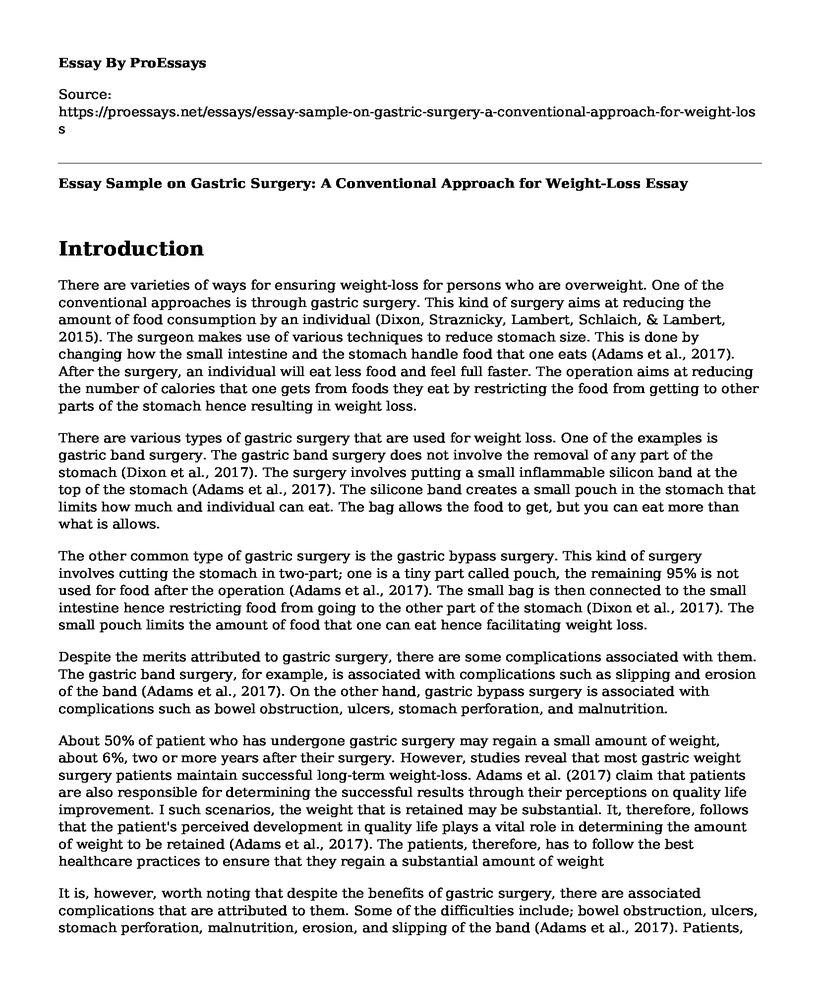Introduction
There are varieties of ways for ensuring weight-loss for persons who are overweight. One of the conventional approaches is through gastric surgery. This kind of surgery aims at reducing the amount of food consumption by an individual (Dixon, Straznicky, Lambert, Schlaich, & Lambert, 2015). The surgeon makes use of various techniques to reduce stomach size. This is done by changing how the small intestine and the stomach handle food that one eats (Adams et al., 2017). After the surgery, an individual will eat less food and feel full faster. The operation aims at reducing the number of calories that one gets from foods they eat by restricting the food from getting to other parts of the stomach hence resulting in weight loss.
There are various types of gastric surgery that are used for weight loss. One of the examples is gastric band surgery. The gastric band surgery does not involve the removal of any part of the stomach (Dixon et al., 2017). The surgery involves putting a small inflammable silicon band at the top of the stomach (Adams et al., 2017). The silicone band creates a small pouch in the stomach that limits how much and individual can eat. The bag allows the food to get, but you can eat more than what is allows.
The other common type of gastric surgery is the gastric bypass surgery. This kind of surgery involves cutting the stomach in two-part; one is a tiny part called pouch, the remaining 95% is not used for food after the operation (Adams et al., 2017). The small bag is then connected to the small intestine hence restricting food from going to the other part of the stomach (Dixon et al., 2017). The small pouch limits the amount of food that one can eat hence facilitating weight loss.
Despite the merits attributed to gastric surgery, there are some complications associated with them. The gastric band surgery, for example, is associated with complications such as slipping and erosion of the band (Adams et al., 2017). On the other hand, gastric bypass surgery is associated with complications such as bowel obstruction, ulcers, stomach perforation, and malnutrition.
About 50% of patient who has undergone gastric surgery may regain a small amount of weight, about 6%, two or more years after their surgery. However, studies reveal that most gastric weight surgery patients maintain successful long-term weight-loss. Adams et al. (2017) claim that patients are also responsible for determining the successful results through their perceptions on quality life improvement. I such scenarios, the weight that is retained may be substantial. It, therefore, follows that the patient's perceived development in quality life plays a vital role in determining the amount of weight to be retained (Adams et al., 2017). The patients, therefore, has to follow the best healthcare practices to ensure that they regain a substantial amount of weight
It is, however, worth noting that despite the benefits of gastric surgery, there are associated complications that are attributed to them. Some of the difficulties include; bowel obstruction, ulcers, stomach perforation, malnutrition, erosion, and slipping of the band (Adams et al., 2017). Patients, therefore, need to be informed on the best practices for weight reduction. The medical doctors need to recommend the best surgery methods that are health-friendly and cause no risks to the life of the patients both in the short and long term.
References
Adams, T., Davidson, L., Litwin, S., Kim, J., Kolotkin, R., & Nanjee, M. et al. (2017). Weight and Metabolic Outcomes 12 Years after Gastric Bypass. New England Journal Of Medicine, 377(12), 1143-1155. doi: 10.1056/nejmoa1700459
Dixon, J., Straznicky, N., Lambert, E., Schlaich, M., & Lambert, G. (2015). Laparoscopic Adjustable Gastric Banding and Other Devices for the Management of Obesity. Circulation, 126(6), 774-785. doi: 10.1161/circulationaha.111.040139
Cite this page
Essay Sample on Gastric Surgery: A Conventional Approach for Weight-Loss. (2023, Feb 15). Retrieved from https://proessays.net/essays/essay-sample-on-gastric-surgery-a-conventional-approach-for-weight-loss
If you are the original author of this essay and no longer wish to have it published on the ProEssays website, please click below to request its removal:
- Essay on Public Health: Aim for Monitoring and Evaluation of Behavioural and Psychological Symptoms of Dementia
- Maternal Health Problems in Nigeria Essay
- The ANA Code of Ethics: How Do You Incorporate This Into Your Practice?
- Terrorist's Impact on Emergency Management Planning
- Malpractice in Nursing Essay Example
- Paper Example on Mild Hypothermia to Prevent Brain Damage After Cardiac Arrest
- Synergy of Human Rights and Ethical Principles in Nursing: A Comprehensive Overview Example







